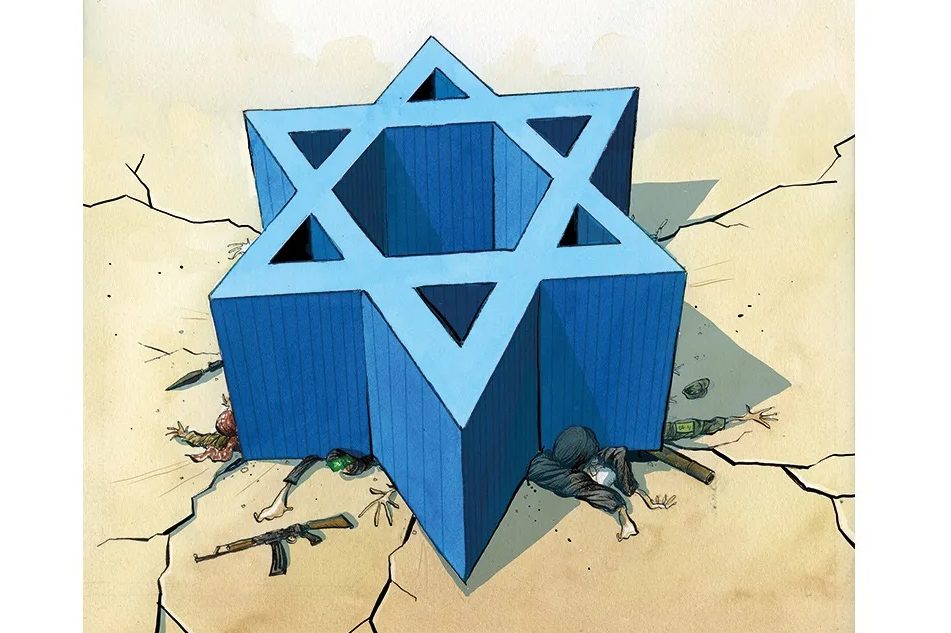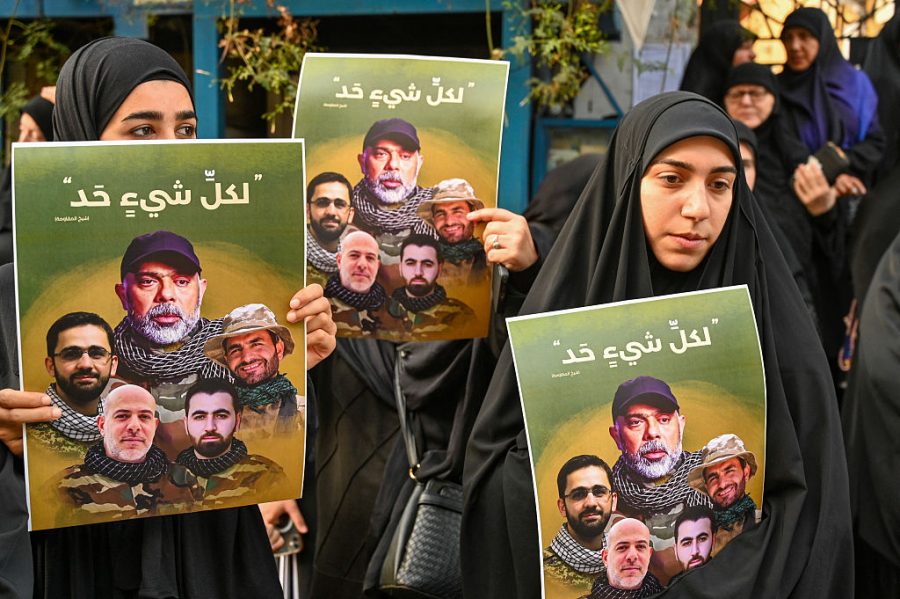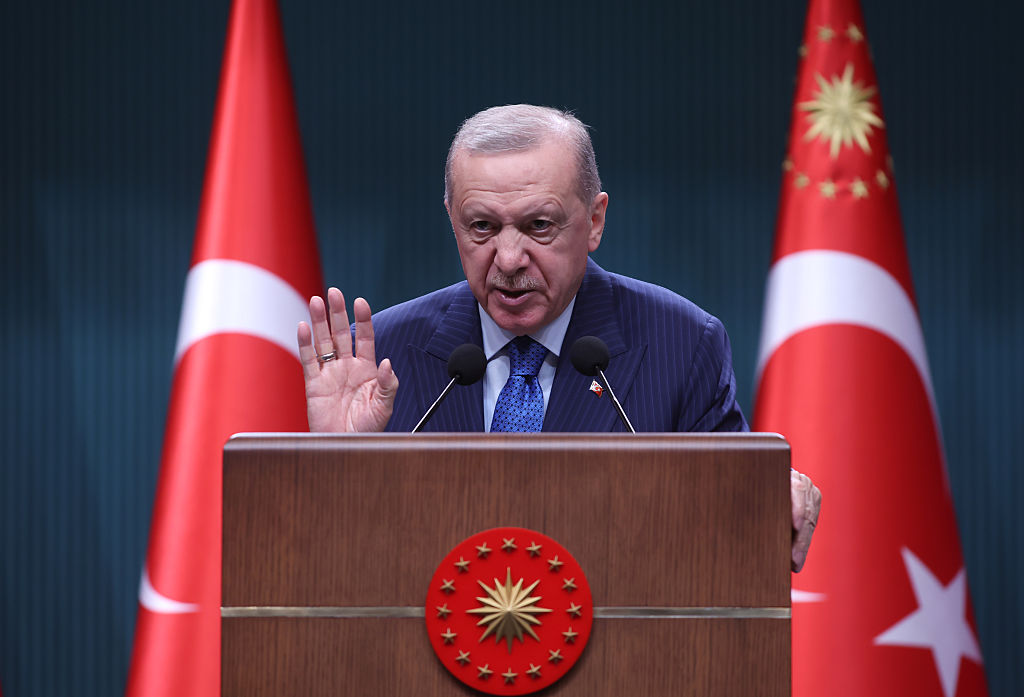Iran has fallen into the trap set by Israel. It has taken the bait after months of failing to respond to a series of devastating — and humiliating — attacks, which decapitated its Lebanese militia, Hezbollah, and killed the leader of Hamas in Tehran. But the regime may have self-immolated by firing missiles at Israel on Tuesday night, an attack meant to inflict real harm — which inevitably means an Israeli response. Israel’s prime minister, Benjamin Netanyahu, may now get the war that some have accused him of wanting all along: a war to destroy the regime in Tehran, fought with American help. The hardliners on both sides are running things. The past week has shown there is no such thing as “escalating to de-escalate” — only escalation. The window for diplomacy is closing and what happens next depends on an American president in the dying days of his administration.
Tuesday night’s attack was only the second time that Tehran has targeted Israel directly. The first was in April, when it fired about 300 missiles and drones. Those were not Iran’s most effective weapons and Israel’s Iron Dome air defenses had little trouble intercepting them. It was performative and many saw through the performance. This time was different. There were fewer missiles, about 180 according to the Israelis, but they were among the most advanced that Iran has, the Fattah-1 hypersonic missile that travels at five times the speed of sound. Phone video showed them streaking through the sky, impossibly fast. They are still quite inaccurate and those that weren’t blown up in the air fell on open ground. The only casualty was a Palestinian worker from Gaza, killed by the tail section of a rocket that dropped from the sky as he was crossing a deserted road in the West Bank.
Netanyahu may now get the war some have accused him of wanting all along
Shortly after the attack, Netanyahu said in a video released by his office: “Iran made a big mistake tonight and it will pay for it.” For all the tough talk — and no doubt Netanyahu means it — there was a moment of indecision, or at least of hesitancy. As the first wave of ballistic missiles made its way towards Israel, the Israeli cabinet was meeting in a bunker near Jerusalem. The discussion was reported to have ended without deciding what shape Israeli retaliation would take. The Israeli media was briefed that a final plan wasn’t agreed because Netanyahu and other officials wanted to consult the Biden administration first. Israel will need to make sure the US has its back if the conflict with Iran becomes an all-out war — a steady supply of bombs and even what Israeli officials call “operational support.”
The US Navy has two aircraft carriers in the Middle East and half a dozen warships that can fire guided missiles. There are US fighter bombers based in Jordan. No doubt Joe Biden doesn’t want a regional war to erupt in the Middle East during his last days in office — but if that war is inevitable, he may feel he must ensure Israel wins it. Israel is reshaping the Middle East in its favor. The US, too, would be happy to see Iran — and Hezbollah — weakened. Netanyahu may succeed in dragging the US along in its wake. His long career at the top has been defined by defying US presidents. After Bill Clinton met Bibi for the first time, he exploded: “Who the fuck does he think he is? Who’s the fucking superpower here?”
So if Israel does go ahead with the attack that Netanyahu promised after the cabinet meeting, it could — finally — target Iran’s nuclear weapons program. One of his predecessors in office, Naftali Bennett, tweeted that Israel had to act “now” to destroy Iran’s nuclear program “to fatally cripple this terrorist regime.” Bennett may be trying to appear tough — he wants to be prime minister again — and Iran’s nuclear facilities are buried deep underground. The Israeli pilot who led the Osirak raid in 1981, on an Iraqi nuclear plant, told me once that only ground troops could finish the job in Iran. Still, Netanyahu has wanted to attack Iran on as many as four separate occasions during his premiership, only to be stopped by previous American presidents. He may feel, as Bennett put it, that “this opportunity must not be missed.”
An alternative target could be Iran’s oil facilities. The terminal at Kharg island exports more than 90 percent of Iranian oil and is just a short flight by fighter bomber from Israel. There are other, relatively easy targets: a second terminal at Jask on the other side of Iran is served by a long and vulnerable pipeline. And most of Iran’s oil production is concentrated in just four main fields. The price of oil would jump — surely something Biden is desperate to avoid with the US election just a month away. But a few dozen American-made 2,000lb bombs could devastate the Iranian economy at a stroke. The money that pays the wages of Hamas and Hezbollah fighters would be cut off. And if the Iranian economy collapses, the regime would be in real trouble.
Iran’s president, Masoud Pezeshkian, seems all too well aware that his country is walking into Israel’s trap. He told reporters at the UN General Assembly: “They are dragging us to a point where we do not wish to go.” Tehran is almost bankrupt and can’t afford an all-out war with Israel, backed by the US. It is unpopular at home: mass demonstrations have erupted regularly over the past few years — and are always brutally suppressed. The unrest is driven, in part, by poverty and falling incomes. This is one reason why Pezeshkian spent days at the UN trying to revive the nuclear deal, which would ease sanctions and release billions of dollars to the regime. The Iranian president is a relative moderate who talks of reconciliation at home and abroad. All that is in tatters now.
The events of the past few weeks have confirmed Israel’s strategic daring, or Netanyahu’s recklessness, depending on your point of view. Either way, Hezbollah’s and Iran’s assumptions about the rules of the conflict with Israel have been exposed as wildly optimistic. They thought that Israel could not wage a war on two fronts, Lebanon in the north and Gaza in the south; they were wrong. They thought that Israel could not fight such a long war in Gaza: it would get exhausted and Hezbollah’s rocket fire into Israel would be needed only briefly; they were wrong. They thought international pressure would halt the fighting in Gaza, as in so many of Israel’s previous campaigns; they were wrong about that, too.
The price of this miscalculation is that Israeli airstrikes have destroyed what Netanyahu called “large percentages” of Hezbollah’s rockets, an arsenal Iran worked for decades to build up. It was always thought that Israel could not attack Iran because of the thousands of missiles Hezbollah would unleash. But Israel has shown itself unafraid of Hezbollah’s strikes, and has — for the time being — neutralized Iran’s “strategic deterrent.” Iran’s “axis of resistance” appears broken. Israel’s overwhelming military superiority was confirmed again this week when tanks and troops crossed the Lebanese border unopposed by Hezbollah (or by the Lebanese army, which hastily pulled back).
Hezbollah’s and Iran’s assumptions about the rules of conflict with Israel were wildly optimistic
Before that, Israel killed Hassan Nasrallah, Hezbollah’s leader. Yoav Gallant, Israel’s defense minister, called it “one of the most important assassinations in the history of the State of Israel.” It was also just one of many “targeted killings” that eliminated almost the entire top tier of Hezbollah’s command. Nasrallah often used to speak about how the prophet’s grandson, Hussein, had faced a choice between martyrdom or surrender at the 7th-century battle of Karbala, the founding event of Shia Islam. Hussein had as few as seventy-two men against an army of thousands but declared, so the story goes, that he could either draw his sword or suffer humiliation — and “we reject humiliation!”
Israel’s relentless destruction of Hezbollah confronted the Iranian leadership with that same choice: martyrdom or surrender. They were goaded into “rejecting humiliation.” Iran’s supreme leader Ayatollah Ali Khamenei posted on Twitter in (broken) Hebrew: “With God’s help, the blows of the resistance front will grow stronger and more painful against the worn and decaying body of the Zionist regime.” After Israel retaliates, does that mean he will order Hezbollah to fire everything they’ve got? At one of Israel’s crisis cabinets, Netanyahu spoke of “days of historic achievements” but also said Israel was “in a war for our very existence.”
The next day he made a direct appeal to the people of Iran, releasing a videotaped message in English. He seemed to call on them to overthrow the regime, which he said was wasting billions of dollars on “futile” wars. “When Iran is finally free — and that moment will come a lot sooner than people think — everything will be different.” As the Israeli journalist Aluf Benn put it, the Iranian regime is threatened with destruction from without and an uprising from within, and “the decision is now in Khamenei’s hands.” Khamenei would agree with Netanyahu about one thing: the struggle is existential.
Watch more on SpectatorTV:
This article was originally published in The Spectator’s UK magazine. Subscribe to the World edition here.

























